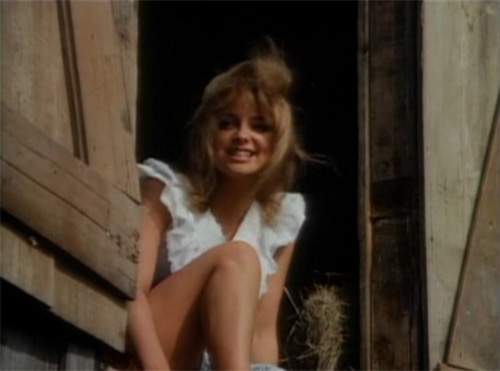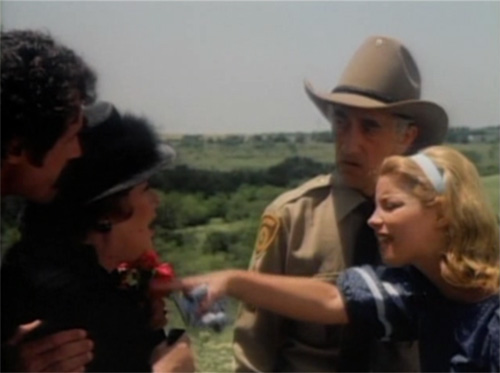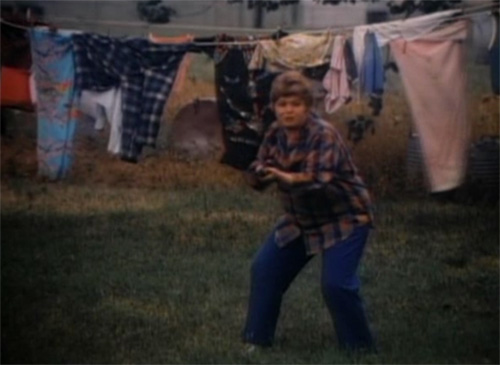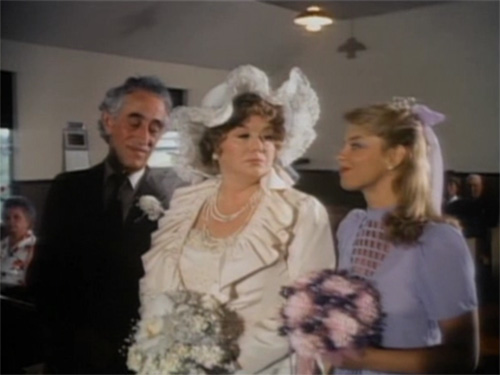A steamy Southern gothic which incorporates the best elements of Hamlet, Tennessee Williams, I Spit on Your Grave, and Hee-Haw, 1984’s daring, country-music-infested Ellie is a nail-biting exposé of the travails of a vivacious, innocent country girl forced to rely upon her wits and cunning to thwart the Machiavellian plots of the stepmother and stepbrothers who done killed her Pa.
Shelley Winters (Night of the Hunter, The Diary of Anne Frank, The Poseidon Adventure) is Cora, who marries the elderly landowner Sidney Jackson (Tom Matts) and insists he make out a will. The very next day Cora, Sid, and Cora’s sons are relishing a picnic on a muddy hill overlooking a chilly lake on an overcast day, when a tragic accident occurs involving an out-of-control wheelchair, “Oh Susanna!”, and a delicious leg of fried chicken:
Sid’s daughter Ellie (Sheila Kennedy, Spring Break) insists that Cora and her clan are responsible for her Daddy’s death. She accuses them outright at his funeral, leading to some Comic Shenanigans in which Cora’s brood stumble backwards into an open grave. But the local sheriff (comedian and would-be presidential candidate Pat Paulsen) finds no evidence to support Ellie’s claims; further, he’s madly in lust with Cora, understandably. Ellie will need to take matters into her own hands. Luckily, she has a secret weapon of her own, as subtly indicated in this beautifully choreographed musical sequence during the opening credits:
Ruthlessly, Ellie begins to dispatch Cora’s sons, using only her feminine charms. Billy, the photographer of the family, so obsessed with his art that at one point he whines to his Mama that she won’t let him take pictures of her toes, is undone by a grueling photo session with Ellie, in which she willingly poses for what seems to be hours on end, in every acre of the farm and countryside, in the pig pen and on the muddy hills, until at last, as she offers him a picture of her prized birthday suit, he takes a most satisfied tumble backward off a cliff. Apparently unaware of the notion of an “alibi,” Ellie attends the funeral, where Cora glares daggers at Ellie…and so the chess-like duel between the two women begins.
While Cora works her own considerable charms on the hapless Paulsen, Ellie sets to work on the next stepbrother, Frank, who can be distinguished by his other brothers because he’s the one with the cowboy hat and not the camera. Perched atop a barn, with one leg dangling out in a sultry manner, playing with her hair, Ellie coos invitingly at Frank, who does his best to ignore her by shooting beer bottles with his rifle and retorting, “Ma says you’re crazy. Ain’t supposed to go near ya.” But soon, like any red-blooded male, he goes up to the hayloft to play bullfighter with Ellie’s dress. This leads to a spectacular end and an even more spectacular funeral:
But the next brother proves to be marginally more intelligent than his siblings. Tom (Edward Albert, Galaxy of Terror) finds Ellie trying to seduce him at a honky-tonk bar…so identified because the band Atlanta is onstage singing a honky-tonk song, with the lyrics:
Honky-tonk heart
Honky-tonk eyes
Make you believe in those
Honky-tonk lies.
While the band starts their next number (“Wishful Drinkin'”), Ellie lures Tom down to Muddy Lake for a dip. She asks him to dive head-first from the pier, for which she’ll reward him with feminine charmy things, but Tom is wise to her Wile E. Coyote-level plan; she has sawed off the water depth signpost so the water seems deeper than it really is. He insists that she take the dive instead; when she refuses, a chase ensues in which Ellie somehow loses her dress and then her panties, in a complex stunt not attempted since Monty Python’s “Scott of the Sahara.” Tom at last confronts Ellie in a shack, where an attempted rape is undone by the poisonous snake she happens to store under her sheets. Jump-cut to another funeral, where Paulsen complains that “we’re runnin’ out of shovels.” (As anyone will tell you, a shovel can only be used once.)
This war reaches its climax when Ellie lures the last stepbrother into a tryst in the attic of her Pa’s house–which Cora’s trying to flip for a healthy profit–while the prospective buyers are downstairs. So vigorous is their coupling that pillows explode their feathers, and furniture, shelves, a bowling ball, and more sundry items than seen at the Columbus Antique Mall (Columbus, Wisconsin) shake, vibrate, tumble and break. Cora’s last remaining boy dies of a heart attack, and the buyers are scared away by the violent lovemaking. At the end of her tether, Cora chases Ellie out of the house via shotgun.
This daylit, buckshot-spattered chase ends with a wrestling match, when inexplicably it’s nighttime and the sheriff arrives, apparently because that’s how late it took before Pat Paulsen arrived on the set that day, and the two women emerge from the mud with their dignity intact. Turns out the sheriff has evidence Cora’s murdered old Sid; who could have predicted that Billy’s photo essay of the drowning might actually make a late-plot arrival to settle all events? Cora is arrested, and Ellie thanks the sheriff for listening to his heart and not his nether regions when the evidence passed into his possession.
Still, in the grand tradition of Shakespearean comedy, Ellie must end with a wedding, as the sheriff and Cora tie the knot anyhow.
The song stylings of Charley Pride and Atlanta, which have only been absent for approximately three minutes of the entire film, rise once again to accompany the ending credits when we are reminded that yes, the great Shelley Winters was still active and working in 1984.













